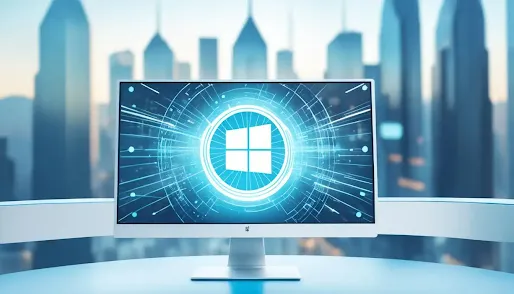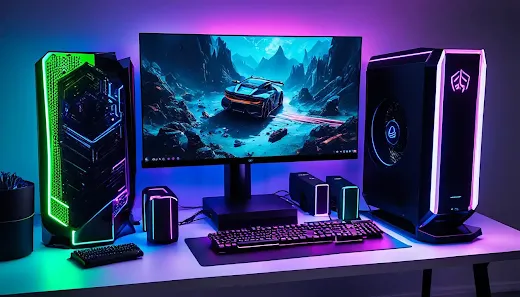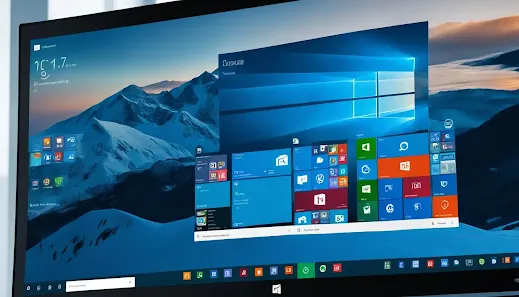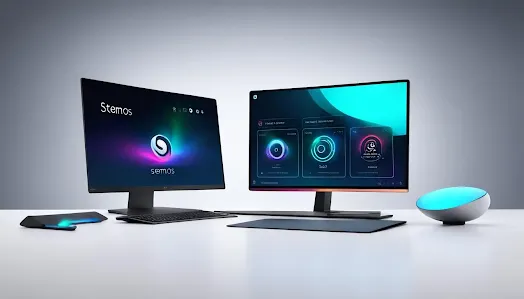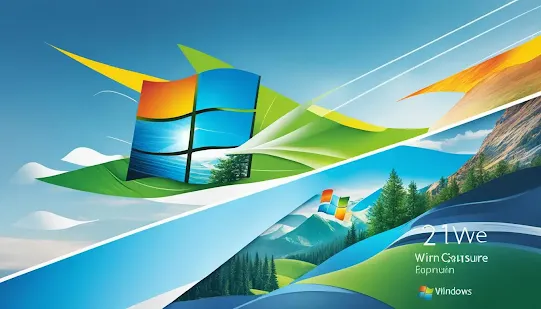In this article, we will explore the best Windows operating systems (OS) that offer optimized performance, speed, and stability for a light PC experience in 2024. We will look at various options, their pros and cons, and how they can enhance your overall Windows experience.
Key Takeaways:
- Choose the best Windows OS for speed, stability and optimized performance on a light PC.
- Consider AtlasOS for the ultimate gaming experience with improved in-game performance.
- Pop_OS is the best Linux distro for gaming with compatibility and stable gaming performance.
- Windows 10 offers extensive software compatibility and features for a wide range of games.
- SteamOS 3 (Holo) provides seamless integration with Steam and a console-like experience.
Best OS for Gaming Overall: AtlasOS
When it comes to gaming, having an optimized and high-performing operating system is essential. That's where AtlasOS comes in. Developed as a transparent and streamlined modification of Windows, AtlasOS focuses on maximizing system performance specifically for gamers. With its emphasis on performance optimization, this Windows gaming OS offers an improved in-game experience.
One of the key advantages of AtlasOS is its ability to reduce unnecessary processes and lower RAM usage, resulting in higher framerates and improved in-game performance. By streamlining the system resources, AtlasOS provides an optimized environment that allows gamers to fully enjoy their favorite titles without experiencing any lag or slowdowns.
Moreover, AtlasOS offers customization options, allowing gamers to tailor their gaming experience according to their preferences. From graphic settings to performance tweaks, users have the flexibility to fine-tune their system to achieve the best possible results.
Positive feedback from the gaming community further reinforces the reputation of AtlasOS as the best OS for gaming overall. Gamers have praised its optimized performance, improved in-game performance, and overall seamless gaming experience.
"AtlasOS has transformed my gaming experience. With its optimizations, my games run smoother than ever before, giving me a competitive edge in online matches."
- GamerX, avid PC gamer
Whether you're a casual gamer or a competitive esports player, AtlasOS delivers the optimized performance you need to elevate your gaming experience to new heights.
| Benefits of AtlasOS | Features |
|---|---|
| Improved in-game performance | Streamlined modification of Windows |
| High framerates and reduced lag | Customization options for personalized experience |
| Reduced RAM usage | Positive feedback from the gaming community |
Best Linux Distro for Gaming: Pop_OS
When it comes to Linux gaming, Pop_OS stands out as one of the best operating systems tailored for both STEM and creative professionals. With its focus on stability, efficiency, and gaming compatibility, Pop_OS provides an exceptional gaming experience for Linux enthusiasts.
Pop_OS is built on top of Ubuntu, a popular Linux distribution, and it offers a user-friendly interface along with a range of features that enhance gaming performance. One of its key strengths is its compatibility with popular gaming platforms such as Steam, ensuring a diverse selection of games to choose from.
Developers will appreciate the various tools and libraries provided by Pop_OS. Whether you're creating your own games or working on other software projects, the development environment in Pop_OS is designed to be robust and efficient.
"Pop_OS truly delivers a stable and efficient gaming experience on Linux. It has become my go-to choice for gaming, thanks to its seamless compatibility with Steam and its strong focus on security." - LinuxGamer09
In addition to gaming performance, Pop_OS places a high emphasis on security. It employs strong security features to protect your system and data, ensuring a safe and enjoyable gaming experience without compromising on privacy.
To summarize, Pop_OS is an exceptional Linux gaming OS that offers compatibility, stability, and excellent gaming performance. Whether you're a STEM professional, a creative individual, or a gaming enthusiast, Pop_OS provides the perfect platform to unleash your gaming potential.
Key Features of Pop_OS:
- Compatible with popular gaming platforms like Steam
- Robust tools and libraries for developers
- Strong focus on stability and security
- User-friendly interface for a seamless gaming experience
Pop_OS Gaming Performance Comparison
| Operating System | Gaming Performance Rating (out of 10) |
|---|---|
| Pop_OS | 9.5 |
| Ubuntu | 8.2 |
| Fedora | 7.7 |
| Arch Linux | 9.0 |
Best Compatibility: Windows 10
Windows 10, developed by Microsoft, is a versatile and robust operating system known for its extensive software compatibility and comprehensive feature set. With its wide range of applications and programs, Windows 10 offers a seamless user experience for both personal and professional use.
One of the key advantages of Windows 10 is its compatibility with a vast library of software and games. Whether you're a casual user or a hardcore gamer, Windows 10 ensures that you can easily run the software and games you need. This compatibility extends to popular gaming platforms like Steam, allowing gamers to enjoy their favorite titles without any compatibility issues.
Windows 10 also offers extensive features that enhance both productivity and entertainment. For gamers, features like DirectX 12 provide improved gaming performance and graphics capabilities. Additionally, Windows 10's integration with Xbox Live allows for seamless integration with Xbox consoles, offering cross-platform play and access to a wide range of Xbox games.
Not only does Windows 10 offer excellent software compatibility and features, but it is also widely adopted by game developers. This means that as a Windows 10 user, you can expect to have early access to the latest games and updates, ensuring that you're always at the forefront of the gaming experience.
Windows 10 is a reliable and user-friendly operating system that caters to a diverse range of needs. Whether you're a professional seeking a stable and efficient workstation or a gamer looking for optimal gaming performance, Windows 10 delivers on all fronts.
With Windows 10, you can enjoy extensive software compatibility, a comprehensive feature set, and a user-friendly interface that makes it an ideal choice for all your computing needs.
SteamOS 3 (Holo)
SteamOS 3 (Holo) is a Linux-based operating system designed by Valve Corporation, the creators of the Steam gaming platform. It offers a seamless integration with Steam, providing gamers with a console-like experience on their PCs. This Linux-based OS combines the power of Linux with the extensive library of games available on Steam, creating a unique gaming environment.
SteamOS 3 is open-source, which means it is community-driven and invites contributions from developers and enthusiasts. The collaborative nature of the operating system allows for continuous improvement and customization, making it an ideal choice for those who prefer a Linux-based gaming experience.
Key Features of SteamOS 3 (Holo)
- Linux-based OS: SteamOS 3 is built on the Linux operating system, providing users with the benefits of Linux's stability, security, and flexibility.
- Seamless Steam integration: This operating system offers a seamless integration with the Steam gaming platform, allowing users to access their game library, community features, and in-game activities without any hassle.
- Console-like experience: SteamOS 3 provides a user-friendly interface optimized for gaming, giving players a console-like experience on their PCs.
- Customization options: The open-source nature of SteamOS 3 encourages customization, allowing users to personalize their gaming environment based on their preferences.
SteamOS 3 (Holo) is a game-changer for Linux-based gaming. Its integration with Steam and focus on customization make it an exciting choice for gamers who want the best of both worlds - the power of Linux and the vast library of games available on Steam.
Customized Windows OS: ReviOS
If you're a gamer or a power-user looking for a Windows operating system that prioritizes speed, performance, and low latency, ReviOS is the customized solution you've been waiting for. By removing unnecessary features and services, ReviOS optimizes gaming performance without compromising stability.
ReviOS is built upon the foundation of Windows 10, offering a leaner and more efficient version of the popular operating system. It is specifically designed to provide an exceptional gaming experience while supporting all games compatible with Windows.
"ReviOS has greatly enhanced my gaming experience. It runs smoothly and efficiently, allowing me to fully immerse myself in the game without any distractions." - Jake, avid gamer
With ReviOS, you can expect faster load times, improved frame rates, and reduced lag, all crucial factors for an optimal gaming performance. By streamlining the operating system and fine-tuning its settings, ReviOS ensures that your gaming sessions are seamless and immersive.
Gaming Performance Optimization
ReviOS goes above and beyond in optimizing your gaming performance. Here are some key features that make it the ultimate choice:
- Optimized Resource Allocation: ReviOS intelligently manages system resources to allocate more power to your games, resulting in smoother gameplay and faster response times.
- Reduced Background Processes: By minimizing background processes and focusing on the tasks at hand, ReviOS minimizes CPU usage, allowing your games to run without interruptions.
- Low Latency Networking: ReviOS prioritizes network traffic for your games, ensuring minimal latency and maximum responsiveness during online multiplayer sessions.
- Driver Compatibility: ReviOS works seamlessly with a wide range of gaming hardware and peripherals, ensuring that you can take full advantage of your gaming setup.
ReviOS System Requirements
| Minimum Requirements | Recommended Requirements |
|---|---|
| Processor: Dual-core 2.4GHz | Processor: Quad-core 3.0GHz |
| RAM: 4GB | RAM: 8GB |
| Storage: 100GB | Storage: 250GB SSD |
| Graphics Card: DirectX 11 compatible | Graphics Card: DirectX 12 compatible |
ReviOS provides a cutting-edge gaming experience by harnessing the power of Windows and tailoring it to meet the specific needs of gamers. It empowers you to unlock the full potential of your gaming hardware and immerse yourself in the games you love.
Lightweight Windows OS: Tiny 10 and Tiny 11
Tiny 10 and Tiny 11 are customized versions of Windows 10 and Windows 11, respectively, designed for systems with limited resources or for users who prefer a streamlined Windows experience. These lightweight Windows OS options are perfect for those seeking smooth performance even on lower-end hardware.
Both Tiny 10 and Tiny 11 prioritize efficiency by stripping down unnecessary features, services, and bloatware. By doing so, they ensure optimal performance on limited resource systems without compromising functionality. Whether you have an older PC or simply prefer a fast and minimalist operating system, Tiny 10 and Tiny 11 offer a solution.
These lightweight Windows OS versions are particularly beneficial for users who prioritize speed, stability, and a clutter-free interface. By removing unnecessary components, they optimize system resources and provide a seamless user experience.
Key Features:
- Enhanced performance on limited resource systems
- Minimalist design for a streamlined user experience
- Efficient resource allocation for improved system responsiveness
- Reduced startup times and lower memory usage
For users looking to breathe new life into older PCs or enjoy a lightweight operating system without compromising performance, Tiny 10 and Tiny 11 are excellent options. With their emphasis on efficiency and resource optimization, these customized Windows OS versions offer a reliable and responsive experience even with limited resources.
| Feature | Tiny 10 | Tiny 11 |
|---|---|---|
| Operating System | Windows 10 | Windows 11 |
| Version | Customized | Customized |
| Resource Requirements | Lower | Lower |
| Performance | Optimized | Optimized |
| Features | Stripped down for minimalism | Stripped down for minimalism |
Apple macOS Sonoma
Apple's macOS Sonoma is a polished and reliable operating system known for its sleek interface and seamless integration with Apple devices. With its polished OS design, macOS Sonoma offers a visually appealing and user-friendly experience.
Not only does macOS Sonoma provide a visually stunning interface, but it also delivers reliable performance that consistently exceeds user expectations. Apple's commitment to optimizing its software ensures that macOS Sonoma runs smoothly on various Apple devices.
One of the standout features of macOS Sonoma is its regular software updates. Apple consistently releases updates that improve system stability, enhance security measures, and introduce new features. Users can expect a seamless and up-to-date experience with the latest version of macOS Sonoma.
In addition to its polished design and regular updates, macOS Sonoma offers a wide range of included software and utilities. Users have access to a comprehensive suite of productivity applications such as Pages, Numbers, and Keynote, making it easy to create and collaborate on various projects.
While macOS Sonoma is primarily popular among creative professionals due to its robust multimedia capabilities, it also provides a stable and efficient gaming experience. With optimized hardware and software integration, macOS Sonoma delivers smooth gaming performance for both casual and avid gamers.
Current State of AI PCs
AI PCs are revolutionizing the tech industry, with companies placing increasing emphasis on harnessing the power of AI in their hardware. The integration of AI processing capabilities into PCs opens up a whole new world of possibilities and enhanced user experiences. However, the current state of AI PCs is still in its nascent stage.
AI processing primarily relies on advanced genAI tools that leverage machine learning algorithms to perform complex tasks. These tools often heavily depend on cloud processing, utilizing remote servers to handle the computational load. While cloud processing offers scalability and access to vast resources, it poses certain limitations for AI processing on personal computers, primarily concerning privacy, latency, and reliance on internet connectivity.
In recent years, there have been advancements in hardware design to enable local AI processing on PCs. One notable development is the introduction of Neural Processing Units (NPUs) in certain PC hardware. NPUs are specialized chips that accelerate AI workloads, enabling faster and more efficient AI processing on local devices.
Despite the introduction of NPUs, their impact on AI processing in PCs is still limited. Currently, most AI tasks heavily rely on cloud services due to their computational complexity and reliance on vast datasets. As a result, AI PCs are yet to fully realize their potential for local AI processing and real-time AI-driven applications.
In the world of AI PCs, the future holds the promise of AI processing becoming more integrated and prevalent on personal computers. The industry is actively working towards developing genAI tools and algorithms that can leverage the power of NPUs for efficient and localized AI processing.
However, the widespread adoption and integration of NPUs in AI PCs require further advancements in hardware design and software optimization. As technology evolves and more sophisticated AI models and algorithms emerge, the potential for local AI processing on PCs will become more feasible and practical.
To illustrate the current state of AI PCs, here is a comparison table showcasing the key features and limitations of AI PCs:
| AI PC | Key Features | Limitations |
|---|---|---|
| AI PCs with NPUs | - Accelerated AI processing - Lower latency for AI tasks - Potential for on-device AI applications | - Limited support for complex AI models - Limited availability of NPUs in current hardware |
| Cloud-dependent AI PCs | - Access to vast computational resources - Compatibility with cloud-based AI services | - Privacy concerns - Latency due to reliance on internet connectivity |
As technology continues to advance, we can expect AI PCs to become increasingly capable of handling local AI processing tasks. The future holds exciting possibilities for AI-powered personal computing, enabling enhanced productivity, seamless user experiences, and a new era of innovation.
Promise of Neural Processing Units (NPUs)
Neural Processing Units (NPUs) are specialized hardware components designed to enhance the performance of genAI models and enable local AI processing on PCs. Low-power and dedicated, NPUs offer significant advantages in terms of efficiency and speed when compared to traditional CPUs or GPUs.
One of the most promising aspects of NPUs is their ability to support energy-efficient AI tasks running in the background. This allows laptops, desktops, and other devices equipped with NPUs to deliver seamless AI-driven experiences without compromising battery life or system resources.
"NPUs enable local AI processing on PCs, ensuring faster response times and reducing the dependency on cloud computing. This results in a more efficient, privacy-focused, and personalized user experience."
A notable example of NPU implementation can be seen in Google's Tensor G3 chip, which powers Pixel phones and supports on-device generative AI. The Tensor G3 chip utilizes NPUs to deliver impressive AI capabilities, such as real-time language translation, enhanced video processing, and adaptive battery management.
As we look to the future, the integration of NPUs in PCs holds immense potential for various AI applications, including natural language processing, computer vision, and deep learning. NPUs offer faster and more efficient processing of genAI models, allowing for improved performance across a range of AI-driven tasks and applications.
To provide a comprehensive overview of the benefits of NPUs, the table below highlights their key features and advantages:
| Key Features | Advantages |
|---|---|
| Low-power consumption | Enables energy-efficient AI processing |
| Optimized for genAI models | Enhances performance and speed |
| Dedicated hardware | Reduces reliance on CPU and GPU resources |
| Supports local AI processing | Improves privacy and reduces dependency on cloud computing |
As the tech industry continues to evolve, the widespread adoption of NPUs in future PC hardware holds the promise of unlocking new frontiers in AI-driven innovation. By leveraging NPUs, AI applications will become more accessible, efficient, and capable, creating exciting opportunities for both developers and end-users alike.
Windows and AI PCs
As the integration of artificial intelligence (AI) continues to revolutionize various industries, Microsoft is actively working towards incorporating AI capabilities into Windows-powered PCs. The vision is to leverage Neural Processing Units (NPUs) to power AI-driven features and enhance the overall user experience.
However, it's important to note that the current support for NPUs in Windows is limited. Currently, only Windows Studio Effects make use of the new hardware, offering users a glimpse of the potential AI-powered functionalities. Users can expect more NPU-powered features with a future "AI release" of Windows, which is currently under development.
By integrating NPUs into Windows, Microsoft aims to unlock a range of AI-powered capabilities, such as advanced image and voice recognition, natural language processing, and personalized recommendations. These features have the potential to significantly enhance productivity, efficiency, and user satisfaction on Windows-powered AI PCs.
Windows Studio Effects:
One example of the current integration of NPUs in Windows can be seen in the Windows Studio Effects. This feature leverages AI capabilities to enhance creativity and productivity by offering real-time effects and improvements while working on images and videos.
Windows Studio Effects utilizes the power of NPUs to enable seamless background removal, dynamic filters, and scene detection, among other functionalities. This integration highlights the potential of NPUs in delivering enhanced user experiences on Windows-powered AI PCs.
Although AI integration in Windows is currently limited to specific features, the development of NPUs and the ongoing efforts by Microsoft indicate a promising future for AI capabilities on Windows-powered PCs. As NPUs become more widespread and integrated into a broader range of hardware, users can expect a new era of intelligent computing that leverages AI to deliver powerful, personalized experiences.
Conclusion
When it comes to choosing the best Windows operating system for optimized performance and an immersive gaming experience, it is crucial to consider your specific needs and preferences.
For gamers looking for the ultimate gaming OS, AtlasOS with its focus on optimized performance and improved in-game performance is a top recommendation. Its streamlined modification of Windows reduces processes and lowers RAM usage, resulting in higher framerates and an enhanced gaming experience.
On the other hand, Pop_OS, a Linux-based operating system, provides a stable and efficient gaming experience with compatibility with popular gaming platforms such as Steam. With its strong security features and tools for developers, it is an ideal choice for gamers in the Linux ecosystem.
If broad software compatibility is your priority, Windows 10 is a versatile and robust operating system offering extensive features and supporting a vast library of games. Its compatibility with DirectX 12 further enhances gaming performance.
Lastly, macOS Sonoma, known for its polished interface and seamless integration with Apple devices, not only appeals to creative professionals but also delivers a reliable and efficient gaming experience.
While AI PCs with NPUs show promise for future AI capabilities, their current impact is limited. It is essential to stay updated on the evolving landscape of Windows OS and AI integration to harness the potential of these technologies.
Ultimately, the choice of the best Windows OS depends on your specific needs, whether it's optimized gaming performance, software compatibility, or future AI capabilities. Consider your preferences, explore the options, and make an informed decision that aligns with your requirements.
FAQ
What is AtlasOS?
AtlasOS is a transparent and streamlined modification of Windows that focuses on maximizing system performance for gamers. It reduces processes and lowers RAM usage, resulting in higher framerates and improved in-game performance.
What is Pop_OS?
Pop_OS is a Linux-based operating system developed specifically for STEM and creative professionals. It offers a stable and efficient gaming experience, with compatibility with Steam and other gaming platforms. It provides various tools and libraries for developers and has strong security features.
What is Windows 10?
Windows 10, developed by Microsoft, is a versatile and robust operating system known for its extensive software compatibility and comprehensive feature set. It supports a vast library of games and offers features like DirectX 12 for enhanced gaming performance. It is widely adopted by game developers, ensuring early access to the latest games.
What is SteamOS 3 (Holo)?
SteamOS 3 (Holo) is a Linux-based operating system designed by Valve Corporation, the creators of the Steam gaming platform. It provides seamless integration with Steam, offering a console-like experience on a PC. It is community-driven and open-source, inviting contributions from developers and enthusiasts.
What is ReviOS?
ReviOS is a customized version of Windows that focuses on speed, performance, and low latency for gamers and power-users. It removes unnecessary features and services to optimize gaming performance without sacrificing stability. It offers a leaner, more efficient version of Windows 10 and supports all games compatible with Windows.
What are Tiny 10 and Tiny 11?
Tiny 10 and Tiny 11 are customized versions of Windows 10 and Windows 11, respectively, designed for systems with limited resources or for users who prefer a streamlined Windows experience. They strip down unnecessary features, services, and bloatware to ensure smooth performance even on lower-end hardware.
What is macOS Sonoma?
macOS Sonoma is a polished and reliable operating system known for its sleek interface and seamless integration with Apple devices. It receives regular updates and offers a wide range of included software and utilities. While primarily popular among creative professionals, it also provides a stable and efficient gaming experience.
What are AI PCs?
AI PCs are gaining attention in the tech industry, with companies emphasizing their hardware's AI capabilities. However, current genAI tools rely heavily on cloud processing rather than local computation. NPUs (neural processing units) are introduced in some PC hardware to enable future local AI processing, but their impact is limited at the moment.
What are NPUs?
NPUs are dedicated, low-power hardware designed to accelerate genAI models and enable local AI processing on PCs. The promise is that future PCs will have NPUs, allowing for energy-efficient AI tasks to run in the background. Google's Tensor G3 chip on Pixel phones is an example of NPU implementation for on-device generative AI.
What is the current state of Windows and AI integration?
Microsoft aims to integrate NPUs into Windows PC for AI-powered features. However, current Windows support for NPUs is limited, with only Windows Studio Effects taking advantage of the new hardware. A future "AI release" of Windows is expected to deliver more NPU-powered features, but it is still under development.

